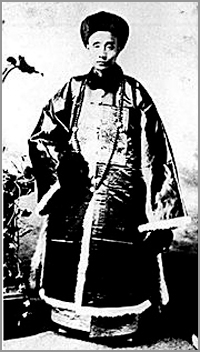|
Ge Kunhua (1838-1882) was the first Chinese language instructor at Harvard University. A locally prominent scholar and gentleman from the region of Ningbo, Ge was recruited to teach Chinese by Francis Knight. Knight, a native of Boston and longtime resident in China, had endeavored for some years to recruit and fund a qualified instructor of Mandarin to teach at Harvard. Drawing upon the local contacts of E. B. Drew and H. Ballou Morse, both graduates of Harvard College working in the customs service of China, and a fund that he raised from donations in the United States, Knight finally succeeded by engaging Ge Kunhua in June, 1879. Ge arrived in Cambridge with his family in September of the same year, and immediately began teaching. |
 |
|
While the exact content of his courses is unknown, it is quite likely, judging from his other pursuits, that at least a portion of the curriculum included classical Chinese. Surviving poems by Ge held in the Harvard archives indicate that he was both classically educated and erudite. One of his surviving verses is a quatrain that he presented to Harvard’s President Elliot in November, 1881. The verse is striking, both for its preservation of the adulatory tone typically of classical Chinese poems written for social superiors, and for the Victorian idiom of the loose English translation that Ge presented with it. 歲歲櫻桃熟,掄才大典逢。 In cherry time, the summer’s prime, Ge’s tenure at Cambridge, which was originally meant to last five years, came to an abrupt and tragic end less than three years after his arrival. In the late winter of 1882, he contracted pneumonia, and after a brief battle with the illness, passed away on February 14, 1882. Ge was survived by his wife and six young children, all of whom had accompanied him to Cambridge. A private subscription was raised in Boston to finance their return to China and to support his children through the completion of their education. Ge’s service as an instructor of Mandarin was not renewed, and it would be four decades before the University once again offered courses in Chinese.
|
|
Copyright © 2024 The President and Fellows of Harvard College | Accessibility | Digital Accessibility | Report Copyright Infringement
